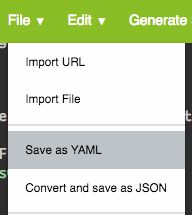官方网址:https://swagger.io/
The Best APIs are Built with Swagger Tools
不同服务之间的调用,前端和后端的调用,现在我们都通过 API 接口实现。API 文档成为了不同模块之间联系的纽带,变得越来越重要,Swagger 就是一款让你更好的书写API文档的框架。
目前的开源版本提供三个工具:https://swagger.io/tools/open-source/
- Swagger Editor 用来设计 OpenAPI
Design APIs in a powerful editor which visually renders your OpenAPI definition and provides real-time error feedback. - Swagger Codegen 用来根据定义的 API 生成不同语言的代码
Build and enable consumption of your API by generating server stubs and client SDKs with minimal plumbing. - Swagger UI 用来产生文档
Automatically generate documentation from your OpenAPI definition for visual interaction, and easier consumption.
一个示例
假设我们的服务想要提供如下的几个 API 接口:
- 添加宠物
POST /pet - 更新宠物
PUT /pet - 查询宠物
GET /pet/{petID} - 删除宠物
DELETE /pet/{petID}
输入和输出都支持 JSON 和 XML。
第一步,通过 Swagger Editor 来设计 OpenAPI
地址:https://swagger.io/tools/swagger-editor/
我们输入如下内容:
swagger: '2.0'
info:
description: >-
Demo
version: 1.0.0
title: Pet Management
termsOfService: 'http://swagger.io/terms/'
contact:
email: [email protected]
license:
name: Apache 2.0
url: 'http://www.apache.org/licenses/LICENSE-2.0.html'
host: petstore.swagger.io
basePath: /v2
tags:
- name: pet
description: Everything about your Pets
externalDocs:
description: Find out more
url: 'http://swagger.io'
schemes:
- https
- http
paths:
/pet:
post:
tags:
- pet
summary: Add a new pet to the store
description: ''
operationId: addPet
consumes:
- application/json
- application/xml
produces:
- application/xml
- application/json
parameters:
- in: body
name: body
description: Pet object that needs to be added to the store
required: true
schema:
$ref: '#/definitions/Pet'
responses:
'405':
description: Invalid input
security:
- petstore_auth:
- 'write:pets'
- 'read:pets'
put:
tags:
- pet
summary: Update an existing pet
description: ''
operationId: updatePet
consumes:
- application/json
- application/xml
produces:
- application/xml
- application/json
parameters:
- in: body
name: body
description: Pet object that needs to be added to the store
required: true
schema:
$ref: '#/definitions/Pet'
responses:
'400':
description: Invalid ID supplied
'404':
description: Pet not found
'405':
description: Validation exception
security:
- petstore_auth:
- 'write:pets'
- 'read:pets'
'/pet/{petId}':
get:
tags:
- pet
summary: Find pet by ID
description: Returns a single pet
operationId: getPetById
produces:
- application/xml
- application/json
parameters:
- name: petId
in: path
description: ID of pet to return
required: true
type: integer
format: int64
responses:
'200':
description: successful operation
schema:
$ref: '#/definitions/Pet'
'400':
description: Invalid ID supplied
'404':
description: Pet not found
security:
- api_key: []
delete:
tags:
- pet
summary: Deletes a pet
description: ''
operationId: deletePet
produces:
- application/xml
- application/json
parameters:
- name: api_key
in: header
required: false
type: string
- name: petId
in: path
description: Pet id to delete
required: true
type: integer
format: int64
responses:
'400':
description: Invalid ID supplied
'404':
description: Pet not found
security:
- petstore_auth:
- 'write:pets'
- 'read:pets'
securityDefinitions:
petstore_auth:
type: oauth2
authorizationUrl: 'http://petstore.swagger.io/oauth/dialog'
flow: implicit
scopes:
'write:pets': modify pets in your account
'read:pets': read your pets
api_key:
type: apiKey
name: api_key
in: header
definitions:
Category:
type: object
properties:
id:
type: integer
format: int64
name:
type: string
xml:
name: Category
Tag:
type: object
properties:
id:
type: integer
format: int64
name:
type: string
xml:
name: Tag
Pet:
type: object
required:
- name
- photoUrls
properties:
id:
type: integer
format: int64
category:
$ref: '#/definitions/Category'
name:
type: string
example: doggie
photoUrls:
type: array
xml:
name: photoUrl
wrapped: true
items:
type: string
tags:
type: array
xml:
name: tag
wrapped: true
items:
$ref: '#/definitions/Tag'
status:
type: string
description: pet status in the store
enum:
- available
- pending
- sold
xml:
name: Pet
ApiResponse:
type: object
properties:
code:
type: integer
format: int32
type:
type: string
message:
type: string
externalDocs:
description: Find out more about Swagger
url: 'http://swagger.io'
编辑的同时在屏幕右侧可以看到对应的 OpenAPI:
我们将这段内容保存为 YAML 格式(pet.yaml)和 JSON 格式(pet.json):
第二步,通过 Swagger Codegen 用来根据定义的 API 生成不同语言的代码
地址:https://swagger.io/tools/swagger-codegen/
在 Mac 上,先通过 Homebrew 安装 Swagger Codegen:
brew install swagger-codegen
随后我们通过命令来生成代码,具体语法参见 https://github.com/swagger-api/swagger-codegen/wiki/Server-stub-generator-HOWTO#java-springboot
例如 SpringMVC:
java -jar modules/swagger-codegen-cli/target/swagger-codegen-cli.jar generate \
-i http://petstore.swagger.io/v2/swagger.json \
-l spring --library spring-mvc\
-o samples/server/petstore/spring-mvc
例如 SpringBoot:
java -jar modules/swagger-codegen-cli/target/swagger-codegen-cli.jar generate \
-i http://petstore.swagger.io/v2/swagger.json \
-l spring \
-o samples/server/petstore/springboot
我们也可以通过 Swagger Editor 的网页来直接生成 Server 和 Client 端的 Stub Code:
Swagger 与 Spring Boot 的整合
参见 Spring Cloud 学习笔记 - No.6 通过 Swagger2 构建 API 文档





